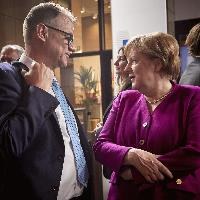(BRUSSELS) – The European Union’s leaders met at a summit Tuesday to take stock of the weekend’s European election results and to kick off the nomination process for new heads of the EU institutions.
At an informal dinner, leaders declared satisfaction with the voters’ highest turnout in 25 years. “This proves that the EU is a strong, pan-European democracy, which citizens care about,” said the European Council’s outgoing president Donald Tusk.
The elections results, which saw Europe’s big centrist blocs lose their majorities, and gains for liberal, Green and nationalist parties, show a more complex parliament, which will require at least three parties to form a majority.
However Mr Tusk said this would make the new European Parliament more representative, reflecting “much greater diversity of views and national sensitivities”. He welcomed “a truly democratic outcome, and I am personally very happy about it.”
The results were a good omen for the EU, he said, as “the vast majority voted for a more effective, stronger and united EU, while rejecting those who want a weak Europe.”
As for Brexit, Mr Tusk said Europeans had seen what Brexit meant in practice, and drawn their conclusions. “Brexit has been a vaccine against anti-EU propaganda and fake news,” he said.
At the summit, EU leaders also mandated the Council president to start consultations with the EU member states and the European Parliament. This will prepare the ground for decisions at the next EU summit on 20-21 June.
Mr Tusk promised to engage in comprehensive consultations, including with the incoming European Parliament, which would be “as open and transparent as possible.”
The nomination process will lead to the European Council electing its President, proposing a candidate for the President of the European Commission, and appointing the President of the European Central Bank and the High Representative of the Union for Foreign Affairs and Security Policy.
President Tusk hopes to achieve clarity on all these posts by the June European Council. Any decision would also need to reflect the diversity of the Union when it comes to geography, the size of countries, gender as well as political affiliation. This will be the objective of the consultations.
“The Treaty is clear,” he said: “the European Council should propose, and the European Parliament should elect. Therefore, the future President of the Commission must have the support of both a qualified majority in the European Council and a majority of the Members of the European Parliament.”
Nomination process for new heads of EU institutions in 2019 (background information)


